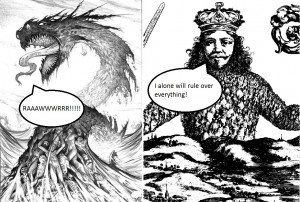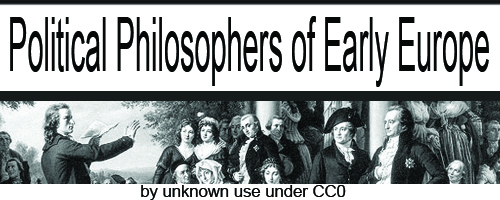Thomas Hobbes
By Aly Nunez
English philosopher Thomas Hobbes was born in 1588. Due to his unique ideas on politics and government, he became known as the father of political philosophy. While his thesis is unpopular, it continues to be relevant in contemporary politics and continues to thrive to this day.
Hobbes published a book called Leviathan in 1651 which discussed his thesis. His main focus was the problem of social order, and how human beings can live together in peace in order to avoid danger and civil conflict. In order to avoid such a fate, Hobbes came up with a solution that he actively championed throughout his life. He said that people should give their obedience to an “unaccountable sovereign.”[1] In other words, Hobbes wanted there to be a single person or group in power that would make decisions on behalf of the people on every social and political issue. Without such a system being implemented, Hobbes feared that mankind would become a “state of nature” that closely resembles civil war. Hobbes believed that this state of nature would be “a situation of universal insecurity, where all have reason to fear violent death and where rewarding human cooperation is all but impossible.”[2] John Locke insisted that Hobbes’s state of nature would be preferable to being subjected to the rule of the arbitrary power of an absolute sovereign. However, Hobbes argued that such a “dissolute condition of masterlesse men, without subjection to Lawes, and a coercive Power to tye their hands from rapine, and revenge”[2] would make the basic security of civilized society impossible.
While a lot was going on in England at the time, Hobbes had two main influences when it came to developing his political thesis. Firstly, Hobbes’s philosophy stems from a reaction to the current system of religious authority. Hobbes rejected the scholastic philosophy that accepted and held up the ideals of such an authority. He insisted that theological disputes should have nothing to do with politics, and that the church should not have an influence regarding political issues. Rather, the sovereign should determine the religious practices that he deemed proper. According to Hobbes, citizens should never follow duties from God if it means disobeying the political authority. Secondly, Hobbes had an increasing admiration for the scientific method and mathematical concepts like geometry. Due to this involvement in math and science, Hobbes was very logical when it came to government. He refused to rely on faith alone. Both of these influences affected how Hobbes expressed his ideas on politics and morality.[1]
_-_A_landscape_with_travellers_ambushed_outside_a_small_town.jpg/320px-Sebastiaan_Vrancx_(studio)_-_A_landscape_with_travellers_ambushed_outside_a_small_town.jpg)
by Sebastiaan Vrancx, used under

Hobbes held government in high regard, but he did not hold the same admiration for people. He believed that people as a whole are needy and vulnerable. Hobbes famously stated that the life of man is “solitary, poor, nasty, brutish and short.”[2] While Hobbes has been criticized for this pessimistic view of human nature, his various assumptions are reasonable and logical. Hobbes assumes that people are essentially similar mentally and physically. He says that no one is invulnerable, nor can one person dominate over all others. Hobbes makes the assumption that all men are selfish in nature and make decisions based on their own self-interest. People generally reject death and will do anything in their power to preserve their own life, even at the expense of others if given the choice.[3] Such selfishness, as Hobbes predicts, can only lead to his fate of a state of nature where there is only war and anarchy.
Without government, people cannot thrive. They need to be ruled by an “authoritarian-sounding sovereign.”[1] Hobbes explains his thesis by saying that people do not reasonably wish for an alternative to government. In addition, when a government is forced to be held accountable for its actions, its power is undermined. Therefore, the only logical option is a sovereign authority that is totally unaccountable to its subjects.[1]

by Unknown, used under

Even though Hobbes’s thesis was published in the seventeenth century, it is still considered relevant today. If people do not heed Hobbes’s advice and fail to obey the current political authority, then the natural conditions and horrors of war that Hobbes warned of await. It is extremely unlikely that humans, according to Hobbes, will be able to exist and live in peace and security without a strong ruling government. Instead, people will resort to self-preservation at the cost of others in order to provide for themselves. Hobbes simply wants to take people from a state of nature to a state of civil society with one sovereign authority.
Essentially, Hobbes wants people to give up this “right of nature” in order to jointly appoint a sovereign authority who will decide what is permitted and punish those who do not obey. However, sovereignty as Hobbes imagined it cannot succeed unless people feel some motivation to obey aside from pure self-interest.[1] It is unlikely, though, that people will unquestioningly follow one ruling authority. People desire evidence that supports a concrete reason why they should follow an authority. Therein lays a potential flaw in Hobbes’s theory. However, his political philosophy is undoubtedly based in logic and reason and, despite its flaws, can still be seen in government today.
Thomas Hobbes, as well as other political philosophers of the Enlightenment, were revolutionary in that they raised questions about politics and government that addressed the rights of a government and when, if ever, men should break the law. Hobbes’s views were unpopular, but he presents a philosophy of one all-powerful government with no room for rebellion. While perhaps unrealistic, his ideas can still be seen in different forms in today’s political structure.

by Thomas Hobbes, used under
 by MrRusser, used under
by MrRusser, used under 
[1] Williams, G. (n.d.). Thomas Hobbes: Moral and Political Philosophy. Retrieved 3 30, 2014, from Internet Encyclopedia of Philosophy: http://www.iep.utm.edu/hobmoral/
[2] Hobbes, T. (1651). Lavaiathan. London: Cambridge University Press.
[3]Lloyd, S. A. (2002, February 12). Hobbe’s Moral and Political Philosophy. Retrieved April 6, 2014, from Stanford Encyclopedia of Philosophy: http://plato.stanford.edu/entries/hobbes-moral/
